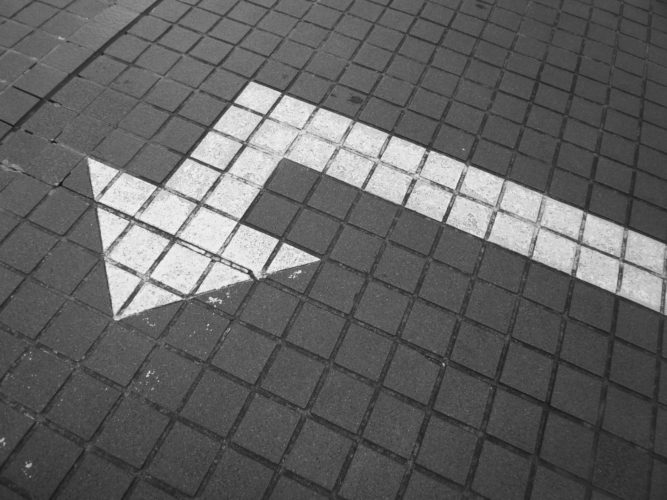You know what’s tricky about pornography? It’s portable.
If you have an issue with drugs or alcohol, you can put physical distance between you and your vice.
But if I lock you in a room with access to absolutely nothing, you can still struggle with pornography.
I get it. I’ve been there. In the middle of church, all of the sudden thinking about porn. While I’d be praying. While I’d be working on school work. While I’d be reading my Bible. While someone else was talking to me.
There are many of you in the same place. You’re doing your best to stay away from it, trying to be free, and then your brain betrays you.
Many of you have emailed, “What am I supposed to do? How am I supposed to get these dirty thoughts out of my mind!?” It makes you feel dirty, defective, disgusting. It frustrates you. It’s hard to explain it, impossible to ‘justify’ it, and people will tell you that it’s because you lack self-control or you aren’t trying hard enough.
So today I want to talk about dealing with the porn that is “stuck in your head.”
The very first thing you need to understand is this: your brain is a machine.
For lack of a better analogy, think of your brain like a computer. To be clear, I am talking about the actual organ that is your brain. The most complex organ in your body that rests inside your skull. The billions of neurons that control basically everything from your hormones to your muscles, to your breathing. The organ that processes your environment, informs your nervous system, and stores memories.
I am not talking about your “mind/heart/soul/spirit” or whatever other word you want to give to the idea of “thought or motive.” That’s a super important distinction, and I’m going to explain why.
I want to state right up front that I am no neuroscientist, so this is going to be a very simplified approach. If you want more of the neuroscienc-y approach to porn addiction, check out Wired for Intimacy by Dr. William Struthers (an actual neuroscientist). But I want to take a stab at this, because I think it’s going to help some of you who are really struggling in this area and feeling so defeated.
First, think of your brain as a machine. Literally for your entire life it is making connections, understanding patterns, growing, learning. The reason you can’t do calculus in preschool but can in high school is because of years of learning.
Here’s why this is important:
When pornography just seems to pop up out of nowhere, that’s literally your brain doing its job.
What? My brain’s job is to tempt me?
No, but it does store memories and facilitate learning.
Stored Memories
I watched pornography for hours a day basically every day for years. That’s a lot of “data,” if you will, stored in my memories. There’s video, audio, pictures. They’re memories. There is no “un-remembering” them.
Sometimes our brains just take a stroll down memory lane. We get songs stuck in our head that we haven’t heard in years. We suddenly remember a funny story from first grade. We can suddenly picture that guy, what’s-his-face, from college. We remember that time we went to the beach with our friends.
Think of all of your memories like a giant photo album. Among all of the typical memories are also memories of pornography. In your brain, there really isn’t any distinction. That video you watched online is a memory just like the children’s movie you watched with friends at a sleepover.
If you use pornography as a way of disconnecting from life, then you really have a photo album filled mostly with pornography. When your mind takes a walk down memory lane, it’s strolling through the Red Light district. But even if pornography was just an “every now and then” type thing, you are still going to have memories of it.
It would be great if we could somehow sort out all of the “bad” memories and delete them. That’s not really an option available to us. Instead, we just have to rely on time to, in a sense, let the memory “rot” or “fade” as we typically say.
I can say from personal experience that as time has gone on my memories of pornography have, in a sense, faded.
Not only have they faded, they’ve been buried under piles of other memories. So, now, when taking a stroll down memory lane, my brain is less likely pull up memories of pornography and more likely to recall sweet dates with my husband, or times from my travels, or life with my baby girl. Are there still memories of pornography in there? Yes. But nowadays, it’s like I have to go looking for them. Like they’ve been taken out of the photo album and stuck in a shoe box in the attic somewhere.
Helping You Out
The second thing to consider is that your brain is on your body’s team. Again, talking about the organ, not the “heart,” which is “deceitful” and “wicked” (Jeremiah 17:9).
Your brain has your best interest in mind (the plays on words are strong in this one). Your brain is the reason why you get hungry and thirsty. Your brain is the reason why you don’t just stick your hand into a fire.
Your brain is an absolutely amazing learning machine, making connections and processing information constantly. It knows what you like and dislike. It knows what brings you pleasure and it likes pleasure.
And guess what? Pornography feels good. Sexual release brings pleasure. If you’ve been struggling with this for any amount of time, your brain has made that connection. Just like it connects sticking your hand in a fire with danger and pain, it connects pornography/sexual release will all sorts of happy feel-good hormones.
If you think to yourself, “Self, I really want to feel good right now. I need a pick-me-up!” your brain whips out a menu of all of the options you have. If you’ve been in pornography at all, it’s likely going to be an option on the list. If you’ve been struggling for a while, it might feel like the only option on that list.
To add a point, addiction is different. Addiction is when your brain tells you, “excuse me! I’m dying here. I need porn to survive. Let’s go! No, I don’t care about your homework. I don’t care about the fact that this is a work computer. I need it and I need it now! I will DIE without it! I need it to function!”
When pornography shows up on “the menu,” we call that temptation and can get so discouraged. “Why am I still struggling with this? I’ve asked God to help me. I’ve prayed. I’m reading my Bible. I’m accountable to friends. What more am I supposed to do?”
Stop being mad at your brain for being… a brain.
God, prayer, Bible, and accountability are all great things. Fantastic tools, but again, there’s no delete button. Your habits have made a connection in your brain. Your brain connects pleasure with pornography. God, prayer, Bible, and accountability don’t sever that connection.
This is where the idea of our “minds” and “hearts” come in. Our brains (the organ) don’t know any better. The brain says, “I want to feel good, so I go over there.” It’s the heart and mind that say, “Yes, we could go through there, but we shouldn’t. We should go here instead. This will be better for us in the long run. This is what honors God.”
Reading your Bible doesn’t tell your brain, “Hey, you know how you thought pornography made you feel good? It actually didn’t.” It says, instead, “I know that when you did that, it did make you feel good, but you shouldn’t have done that.”
Renewing our minds isn’t something that just happens; we miss that so often in church.
We assume that Jesus comes through with a giant eraser and all bad thoughts are gone. Then when we still struggle with bad thoughts, we think Jesus missed a spot, or we’re too stained to be saved. But, renewing our minds is not the same as “erasing our brains.”
The word for “mind” in Romans 12:2 implies the intellect, reasoning, or judgment. In Philippians 2, when we’re told to have the same mind as Christ, the word is understanding or thinking. In 2 Corinthians 10:5, when we “take every thought captive” the word for thought means perception or purpose.
What does all of this mean?
It means you’ve probably been fighting the wrong battle on the wrong field. If you’ve been aiming for eradicating all of the “bad” content out of your head and thinking that’s what it means to honor God, you’re fighting the wrong fight. You can’t delete memories. You can’t lie to your brain and tell it porn doesn’t give you pleasure.
Our battle is at the next step. When those pictures/videos start playing, what do I do with them? When those lustful thoughts pop up, what is my response? When my brain/body says, “Oh! I know how to get pleasure! Let’s masturbate/watch porn!” what do I do?
Because that’s the part we can control and that’s the part we’re told to control.
We can’t stop our brains from being brains, and that’s great news. Because probably the coolest thing about the human brain is it can learn. Those pathways can be remapped. When the brain flips to porn and you say, “no thank you,” it learns. When your brain says, “I need porn to feel happy right now” but you say, “No” and find a different way, your brain learns.
What do you do then with porn that’s stuck in your head?
Well, I will tell you what I did that helped immensely. I started calling it out. Instead of pretending like it wasn’t there and hoping it would just shrivel up and die, I called it out. I think that’s the image in 2 Corinthians 10:5.
We’re not told to pretend it doesn’t exist. We’re told to take it captive. The word there is a war word. It’s to subdue. When it comes to freedom of the mind, we’re not running scared from out-of-control thoughts. No. We’re taking prisoners. We’re dragging those thoughts kicking and screaming, against their will, to Jesus. We’re cleaning house. We’re taking back ground.
When videos would pop up in prayer, I would literally stop my prayer and say, “Ok, God, I’m having this thought of this video right now and I do not want to dwell on it. I recognize this as something I should have never seen and something I never want to see again.”
That became a powerful weapon, and still is to this day, because yes, nearly two decades into my freedom journey and I can still have occasional memories, or dreams, or errant thoughts.
So many of us think our brains need to change first and then our minds will be renewed. We think we have to get rid of all the porn in our brains first before we can think good thoughts, but I truly believe we’ve got it backwards.
God gives us the power to renew our minds first, and it’s that renewed mind that enables us to “retrain” our brains.
Instead of focusing on ridding our brain of pornography, we have to start “changing our minds” about pornography.
Our struggles will always be a part of our story and our brains know our stories. But, with God’s grace and His strength, we can start taking back the ground that the enemy tried to claim. We can find our stories healed and redeemed.
Instead of condemnation and feelings of defeat, as if we’re victims of our own memories, we can find grace and strength to fight the battle for our minds. It’s a battle won bit-by-bit, moment-by-moment, thought-by-thought, memory-by-recalled-memory.
Make no mistake, it’s a battle God wants you to fight. Just be sure you’re fighting the right enemy in the right place.






